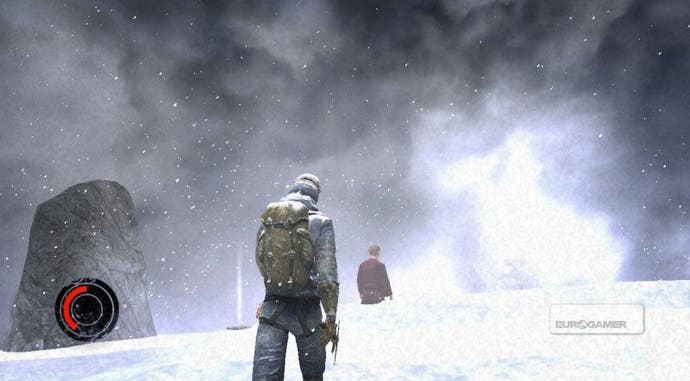Cursed Mountain
Poxy.
The control system is at its worse in combat situations. You can't move whilst Eric is in aiming mode, so the control stick suddenly transitions awkwardly from controlling movement to point of view. All the while, you have to hold the remote up and point at the screen to shoot ghosties with your mystical pickaxe. There's absolutely no reason why all the aiming couldn't be done with the remote alone, leaving you free to move around with the stick.
It's hideously awkward, and leads to situation after ridiculous situation where you're forced to jog slowly away from ghosts whenever they get too close, then find another suitable spot to shoot at them from standstill. This is the sort of nonsense we might have put up with ten years ago, but it's not something we'd choose to do for fun today.
Speaking of mystical pickaxes, Cursed Mountain's incorporation of Buddhist religious tradition frequently oversteps the line between authentic and overzealous, and is often completely ludicrous. Having a blessed pickaxe that shoots beams at ghosts is ridiculous, whether or not the upgrades you collect are correctly-named ritual implements with half a screen of explanatory text.
The discoverable notes and journal entries dotted around the game to flesh out the backstory are full of incomprehensible language. Though the game's attempts to dress up healing and aiming as incense-burning and opening the Third Eye are sort of endearing, they're as close as Cursed Mountain ever gets to actually integrating any of its Buddhist shtick into the gameplay.
The motion controls, too, suffer from a common problem in that they have the opposite of the intended effect; instead of making you feel immersed, they pull you straight out of the game and back into your living room as you struggle with two bits of unresponsive plastic.

Breaking supernatural seals in order to finish off a ghost, open a door or trigger an event is a matter of locking onto them and following a few gesture prompts - they're nothing too complex, but it often takes two or three tries before the game acknowledges your movements, especially when it comes to forward thrusts.
All of that might be worth putting up with if the pacing wasn't so tortuously slow and the mildly interesting plot wasn't so drawn-out - problems that are exacerbated the longer you play. Trudging up a mountain in search of a shaman whilst listening to Eric's inner monologue and fighting ghosts along the way can be fairly engaging; walking incredibly slowly around the same building for 40 minutes searching for three ritual fragments to open a door cannot.
The game's reluctance to challenge you at all only emphasises the drudgery. Killing ghosts with gestures restores some of Eric's health and incense shrines are fairly generous anyway. The only reason you ever die is because the controls get the better of you.
Cursed Mountain has some good ideas, and it's encouraging to see an original survival horror for the Wii. However, its repetitive structure, fiddly controls and slightly shonky construction mean that it's no fun to play.
It's clear from the thoughtful setting and the commitment to Buddhist myth and ritual underpinning the plot that genuine effort has gone into the game, but that doesn't show in the final product. Perhaps fittingly for a game based around scaling a peak, playing Cursed Mountain is more a matter of endurance than anything, despite its worthy intentions.








